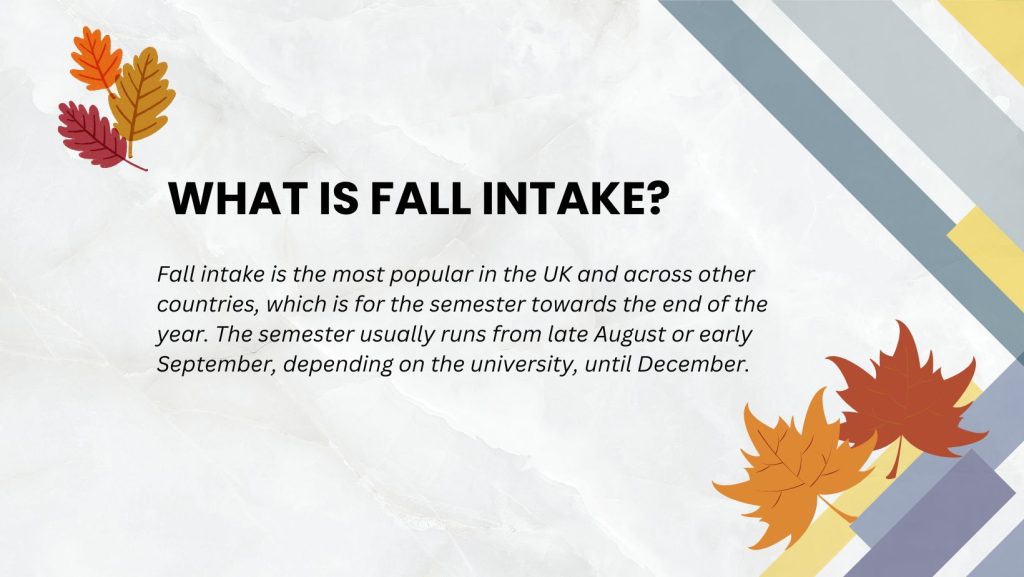Table of Contents
ToggleThe journey to study abroad requires proper planning, and among the primary considerations you should make include the intake semester. The intake semester affects the programmes offered, slots available, and placement after graduation. The two popular intakes across various major countries are Fall Intake vs. Spring Intake. So, which one is better, fall intake vs spring intake? Let’s learn from this blog!
What Is Spring Intake?
Many universities abroad offer fall intakes. However, student admissions during fall intake are more competitive since universities have allocated smaller class sizes for available courses. This makes it less popular among many Indian students, especially those aspiring to study technical or medical courses.
What Is Fall Intake?

It is the most preferred of all intakes in Canada. It has the most significant slots and programmes available in all faculties. It is also referred to as the primary intake in an academic year. Fall intakes offer less competition for getting an offer to study in foreign universities since the classes are more prominent.
Fall Intake vs. Spring Intake Admissions: Factors To Consider
Various factors should be considered when choosing between spring and fall intakes in Australia. The table below depicts the multiple differences and factors that will help you decide which intake to look for.
Acceptance Rate
The fall intake has a higher acceptance rate due to large class sizes and the number of slots available per programme. On the other hand, the Spring intake has a lower acceptance rate due to small class sizes and a limited number of slots available for courses.
Universities
All universities in the USA offer fall intakes. However, there are only a few top universities that offer spring intakes in the USA, including:
- Harvard University
- Yale University
- Cornell University
- California State University
- Stanford University
- Texas State University
- University of Central Florida
Assistantship
More internships and on-campus jobs are available in the fall intake because most of the projects start this semester. However, there are limited to no assistantship opportunities since most projects are underway.
Job Opportunities
With most recruiters organising their job fairs in the fourth month of the year, students in fall intakes have the upper hand. They have an extra semester to indulge in more projects and build their CVs before job opportunities surface. Spring intake students need more time to prepare for the job market, and hiring often starts immediately after their semester, which disadvantages them.
Financial Aid
More grants and scholarships are available for the fall intake, mostly because it is the primary intake, with many students getting admitted to various universities. Although there can be limited scholarships in the spring intake, education loans aren’t affected by semesters, provided you qualify for funding
Courses Offered
A wide variety of programmes are available for fall intakes that run across all faculties. There are limited programmes in the spring intake, and some of the popular alternatives include:
- Computer Science & Engineering
- Business Analytics
- Management Information Systems
- Data Science
- Mechanical Engineering
Extracurricular Activities
Clubs and workshops are usually organised in the fall intake, making many extracurricular activities available for students this semester. Unless you are willing to do a thorough catch-up on the progress made by earlier members, it’s a hustle to get your way into clubs and academic groups in the spring intake.
Readiness
With undergraduate programmes for Indian students ending around May/June, there is minimal time to prepare for the fall intake. The spring intake gives students ample time to settle, process, and prepare for their applications.
Visa
Generally, visa applications aren’t affected by the intakes as the vital aspects are your documentation and overall profile that qualify you to get one. However, you should start your visa application a month before your admission date.
Spring vs Fall Admissions: Adjustments To Make
The fall intake is undoubtedly superior to the spring intake. However, spring Ireland intakes are a good fit for students who never got an offer to study at the university during the fall semester. Although it might rob them of some benefits, they will eventually land their ideal course, if available, and in their dream university. Check some of the adjustments to make:
- Weather: While snowfall in other coutnries might seem charming in movies, the reality is that spring can be one of the coldest months. Temperatures plummet to as low as -30 degrees. Temperatures can range from -8 to -12 degrees, posing a significant challenge for Indian students accustomed to milder climates.
- Groups and Projects: International students starting their courses in the Fall have a six-month head start compared to those beginning in Spring. This discrepancy can make it challenging for Spring intake students to form friendships and professional connections, potentially impacting group project dynamics.
Key Differences Between Fall Intake Vs. Spring Intake
Understand the key differences between fall and spring intake in the following table.
| Feature | Fall Intake | Spring Intake |
| Universities Offering | More universities offer Fall Intake | Fewer universities offer Spring Intake |
| Acceptance Rate | More competitive (higher applicant pool) | Less competitive (potentially higher chance for strong profiles) |
| Job Opportunities | More opportunities due to completed semesters | Less opportunities due to fewer completed semesters |
| Assistantships | More research and teaching assistant opportunities | Fewer research and teaching assistant opportunities |
| Course Selection | Wider range of courses available | Fewer courses available, and some niche courses might not be offered |
| Extracurricular Activities | More time to get involved and take leadership roles | Less time to get involved and take leadership roles |
| Graduation | Potentially graduate in 3 semesters (faster earning) | Less likely to graduate in 3 semesters |
| Study Visa | No impact on visa application | No impact on visa application |
| Readiness | Ideal for students graduating in May/June | Ideal for students needing more time to prepare |
FAQs
What Is The Difference Between Spring And Fall Intake In The US?
- The fall intake runs from September to December, while the spring intake runs from January to May. Fall intake is also categorised as the primary intake, while the spring intake isn’t available in all universities. They also differ in the number of programmes and slots available, with fall offering more options for international students.
Which Is Better Spring Intake Or Fall Intake?
- Fall intake has more advantages than spring intake in many aspects. Some of the superiority is noticed in the university acceptance rate, variety in programmes, number of slots available, financial aid, job opportunities after graduation, and memberships in clubs and associations.
What Is Spring And Fall In the US?
- Spring in the USA occurs in March, April, and May, and fall in September, October, and November. However, the Spring semester begins in January and ends in May, and the Fall semester begins in September and ends in December.
Do Top US Universities Offer Admissions In Spring?
- Only a few top universities offer spring intakes, such as Harvard University, Yale University, Cornell University, California State University, Stanford University, Texas State University, and the University of Central Florida.
Which Intake Should International Students Opt For Spring Or Fall?
- When choosing between fall vs spring intakes, various factors must be considered, such as programmes offered, slots available, universities that offer intakes in either semester, financial aid, and job prospects. While fall intake might be the better option, it all comes down to preference and availability.
Which Intake Is The Best For Job Opportunities In The US?
- The fall intake is the best time for job opportunities in the USA. This is because it gives students enough time to build their portfolios after graduation before the job opportunities arrive, which usually start in May.


















1 thought on “Top PGDM Courses In Canada: Universities & Eligibility”
I have done Bachelor’s in Culinary Arts from India and completed my graduation in the year 2022 .I am 22 years old. After graduation, I have done 1 year paid internship from USA .Now, I would like to take occupational experience and learn culinary skills and also do masters in Culinary arts.How can I find the college n best course / country where I can persue studying further